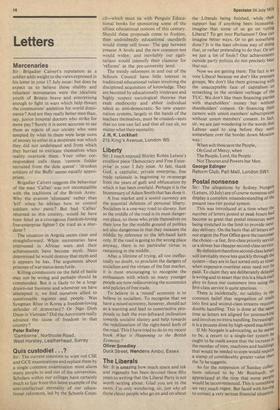Mercenaries
Sir: Brigadier Calvert's reputation as a. soldier adds weight to the views expressed in his letter in your 17 July issue: but does he expect us to believe those shabby and reluctant mercenaries were the idealistic youth of Britain brave and enterprising enough to fight in wars which help thwart the communists' ambition for world dominance? And are they really better men than, say, junior hospital doctors who strike for more pay ? Surely it is more accurate to see them as rejects of our society who were tempted by what to them were large sums of money to enlist in a desperate war which they did not understand and from which they hurried to extricate themselves when reality overtook them. Your other correspondent calls them 'cannon fodder recruited from the dole queue': 'drunken soldiers of the Buffs' seems equally appropriate.
Brigadier Calvert suggests the behaviour of the man 'Callan' was not incompatible with the traditions of the British Army. Why the evasion 'eliminate' rather than 'kill' when he advises how to control soldiers who panic? But had 'Callan' returned to this country, would he have been feted as a courageous freedom-loving free-enterprise fighter? Or tried as a murderer?
The situation in Angola seems clear and straightforward. White mercenaries have intervened in African wars and their achievements have become myth. Neto determined he would destroy that myth and it appears he has. The arguments about prisoner of war status seem futile.
Killing communists on the field of battle may not be wrong and perhaps should be commended. But it is likely to be a longdrawn-out business and whenever we have attempted it, we find ourselves allied to questionable regimes and people. Was Syngman Rhee in Korea a freedom-loving defender of democracy ? Or Ngo Dinh Diem in Vietnam ? Did the Americans really advance the cause of freedom in that country ?
Peter Bailey 'Camborne', Northcote Road, West Horsley, Leatherhead, Surrey


































 Previous page
Previous page